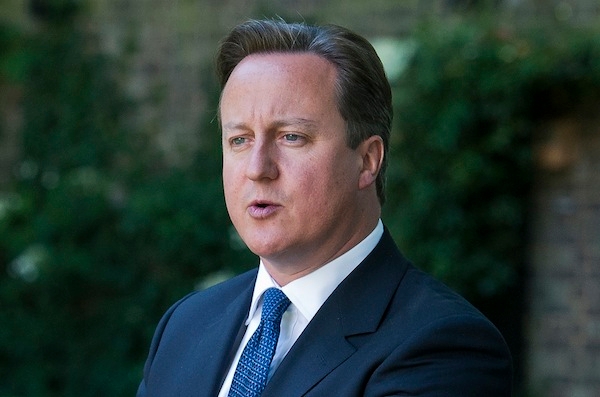David Cameron is far more optimistic than Nick Clegg about arming the Syrian rebels: that much has been clear for a while. He explained why he’s optimistic on Sky’s Murnaghan programme this morning, arguing that if the West doesn’t work with the ‘good’ rebels, then the ‘bad’ rebels will have more of an opportunity to flourish. He said:
‘I want to help the Syrian opposition to succeed and my argument is this: yes there are elements of the Syrian opposition that are deeply unsavoury, that are very dangerous, very extremist and I want nothing to do with them. I’d like them driven out of Syria. They’re linked to al Qaeda. But there are elements of the Syrian opposition who want to see a free, democratic pluralistic Syria that respects the rights of minorities including Christians and we should be working with them.
‘We are working with them and my point is this: that if we don’t work with those elements of the Syrian opposition then we can’t be surprised if the only elements of the Syrian opposition that are actually making any progress in Syria are the ones that we don’t approve of.’
This is an interesting argument as it makes sense technically, but the next question is how on earth do you distinguish between good and bad rebels on the ground? And how do you prevent your arms passing from good rebel to bad rebel? If the UK wants to help the good rebels flourish over and above the bad guys, does that mean they will also fight the bad rebels in some instances?
But it may well be his slightly awkward language around giving parliament a consent for giving armed help to rebels that runs with MPs. The Prime Minister said ‘I would never want to stand in the way of Parliament having a say’, adding after being pressed on whether there will be vote, ‘basically yes we’ve said that’ and that ‘I think Parliament should have a say about these things’. Anyone nervous about Parliament not being given a proper say might not have been fully reassured by those comments: they suggest that some detail will later emerge on the precise nature of the vote that might cause a rumpus.
Here is the transcript of that section of the interview:
DM: But because of that if it does come to arming the rebels and President Obama says, we the Americans want to do it, we the British will go along with them. Would there be a vote? Is there a guarantee of a vote, a debate and a vote in Parliament about that?
DC: We’ve been very clear. I’ve been very clear. I would never want to stand in the way of Parliament having a say and so as William Hague the Foreign Secretary said, you know one way or another of course there would be the opportunity for Parliament to have a say. But we’re not there yet, we haven’t made that decision.
DM: Well the Americans are very close.
DC: Well that’s a decision for the Americans to take. As I say I think where we can actually give the greatest assistance to the official proper Syrian opposition, is advice, is training and is technical support. That is where I actually think the British government working with allies like the Emirates and the Jordanians that is where we can have the greatest influence play the greatest role.
DM: But just to be very clear on that issue Prime Minister. If it does come to giving armed help to the rebels, to the opposition forces in Syria, Parliament would get a say and ultimately a vote on that?
DC: Basically yes we’ve said that.
DM: That is copper bottomed and they would be in a position, then Parliament would be in a position to prevent it happening?
DC: As I said, we haven’t made a decision so the whole issue doesn’t really arise. But I supported having a vote on the Iraq war. As Prime Minister I made sure there was a vote on the action we took in Libya, I think Parliament should have a say about these things. I can’t really go further than that in expressing our views.
That last question, about whether Parliament could prevent such action, is the key, and the Prime Minister does not offer a copper-bottomed guarantee that a vote in Parliament would be binding. He is perhaps acting on the intelligence from the whips reported in today’s Sunday Times: a vote in Parliament looks unlikely to go his way.
 The next Spectator Debate on 24 June will be debating the motion ‘Assad is a war criminal. The West must intervene in Syria’ with Malcolm Rifkind, Andrew Green, Douglas Murray and more. Click here to book tickets.
The next Spectator Debate on 24 June will be debating the motion ‘Assad is a war criminal. The West must intervene in Syria’ with Malcolm Rifkind, Andrew Green, Douglas Murray and more. Click here to book tickets.







Comments